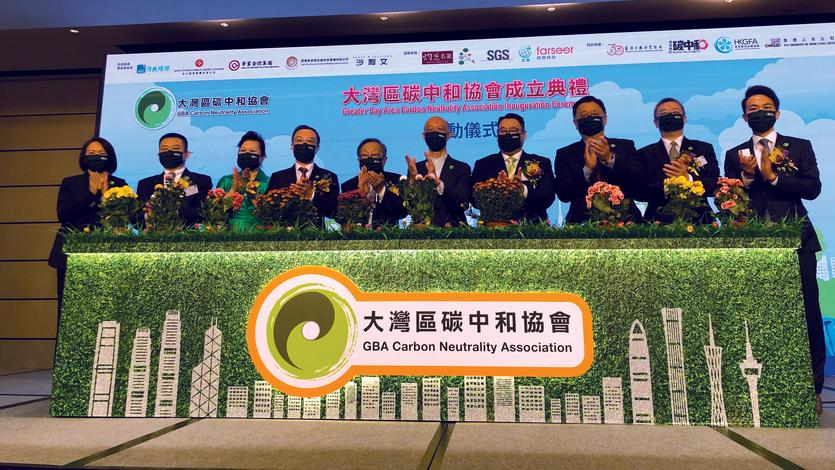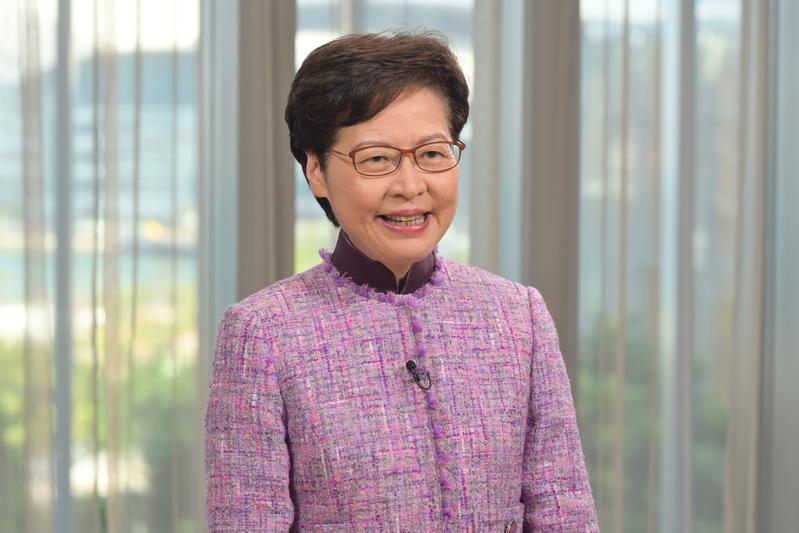 The inaugural ceremony of the Guangdong-Hong Kong-Macao Greater Bay Area Carbon Neutrality Association is held at the Hong Kong Convention and Exhibition Centre on Dec 10, 2021. Officials, academics, business representatives and sustainability advocates attended the event and joined in a dialogue on carbon emission. (WANG YUKE / CHINA DAILY)
The inaugural ceremony of the Guangdong-Hong Kong-Macao Greater Bay Area Carbon Neutrality Association is held at the Hong Kong Convention and Exhibition Centre on Dec 10, 2021. Officials, academics, business representatives and sustainability advocates attended the event and joined in a dialogue on carbon emission. (WANG YUKE / CHINA DAILY)
Just as every economy in the world is striving to achieve net-zero carbon emissions, the Guangdong-Hong Kong-Macao Greater Bay Area Carbon Neutrality Association was established, concentrating the wisdom and agencies of officials, firms, academics and sustainability advocates, in the hopes of catalyzing energy transition and a sustainable economy in China.
The establishment of the association is perfectly timed and necessary, as China, like other countries, is racing against time to combat greenhouse emissions, said Chan Ching-chuen, an esteemed Hong Kong scientist, at the inaugural ceremony of the association on Friday. Chan, the head of the Department of Electrical and Electronic Engineering at the University of Hong Kong, serves as a senior consultant at the association.
READ MORE: Hong Kong strives to achieve carbon neutrality by 2050
China has pledged that carbon dioxide emissions will peak before 2030 and to achieve carbon neutrality before 2060. Since China joined the Paris Agreement in 2015, the country has done its utmost to limit global temperature rises to between 1.5 and 2 Celsius compared to pre-industrial levels. The national 14th-Five Year Plan (2021-2025), endorsed by the central government, sets a goal of reducing carbon dioxide intensity by 18 percent and energy intensity by 13.5 percent. In October, China announced it aims to derive over 80 percent of its total energy from non-fossil fuel sources by 2060.
Hong Kong Chief Executive Carrie Lam Cheng Yuet-ngor said in her pre-recorded speech that she hopes the association will help in popularizing green bonds, sustainable investment and expanding market engagement in carbon reduction in Hong Kong
It will be a herculean challenge for China as the balance between CO2 reduction and economic prosperity has yet to be worked out. But Chan says he firmly believes that “the Greater Bay Area is well placed to leverage its unique advantages to steer China on the fast track to carbon neutrality.”
Adhering to the national decarbonization objective, Hong Kong introduced a Climate Action Plan 2050, setting out the vision of “Zero-carbon Emissions‧Liveable City‧Sustainable Development”, and outlining the strategies formulated by a steering committee.
The special administrative region has already cut its per capita carbon emissions from 6.2 tons in 2014 to 4.5 tons in 2020, and endeavors continue to achieve a target of 2 to 3 tons in 2035 and net-zero in 2050, said the Secretary for the Environment Wong Kam-shing.
Acknowledging that Hong Kong has plenty of room to develop new energy, Wong said that this is contingent on the concerted efforts and progress made in the Greater Bay Area.
Hong Kong Chief Executive Carrie Lam Cheng Yuet-ngor said in her pre-recorded speech that she hopes the association will help in popularizing green bonds, sustainable investment and expanding market engagement in carbon reduction in Hong Kong. She said she is convinced that it will bring socioeconomic benefits to Hong Kong in low-carbon technology development, green-tech talent exchange and carbon neutrality discourse among industries.

Hong Kong Chief Executive Carrie Lam Cheng Yuet-ngor delivers a video speech at the inauguration ceremony of the GBA Carbon Neutrality Association, Dec 10, 2021. (PHOTO / HKSAR GOVERNMENT)
Wang Xin, global partner and president of Greater China Frost & Sullivan, agreed with Lam, saying that concerted efforts to reduce carbon emissions within the Greater Bay Area will perpetuate the concept of green practice, encourage the gradual adoption of environmental, social and governance investment across industries, pushing enterprises to embed sustainable investment in their corporate social responsibility management. It will also help in expediting the establishment of ESG disclosure standards.
The integration of humanity, information, physics and funding flows within the Greater Bay Area will be front and center of the pathway to the net-zero finishing point, Chan said.
The integration of humanity, information, physics and funding flows within the Greater Bay Area will be front and center of the pathway to the net-zero finishing point, said esteemed Hong Kong scientist Chan Ching-chuen
Intelligent innovation and technology are among the potent arsenal employed to attain carbon emission reductions, he said. However, a lack of supervision and regulation could turn intelligent innovations into a bane threatening stakeholders’ data security. Chan urged the authorities in the Greater Bay Area to formulate a mechanism to regulate cross-border information and data flow, to ensure absolute security. Information transfer and exchange is a key part in the track for decarbonization, but security cannot be compromised, he stressed.
“We should take a more subversive approach to digitization and intelligentization, keeping our intelligent system (created for the carbon neutrality target) up to date and to the top sophistication of automation.”
ALSO READ: Net-zero carbon emissions by 2050?
Nearly 60 percent of China’s energy use stems from burning coal and the country’s total energy consumption per unit GDP is 1.5 times the world average and 2 to 3 times that of developed countries, which is fairly alarming, said Liu Zhiming, general manager of Beijing-Hong Kong Exchange of Personnel Centre. There’s an urgency to resort to technology for an intervention and prevent industries from spewing greenhouse gas into the atmosphere, he noted.
Liu says ESG penetration rates will spread across corporations in China, as numerous surveys indicate that Chinese firms are now more receptive to disclosing their ESG performance. Plus, the Greater Bay Area Carbon Neutrality Association will join the call for action toward a green economy in China.


